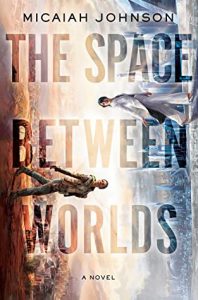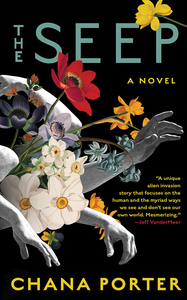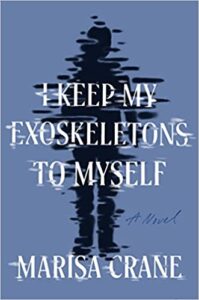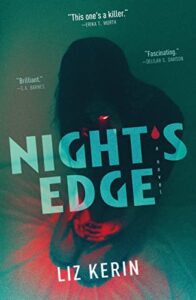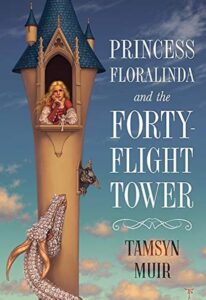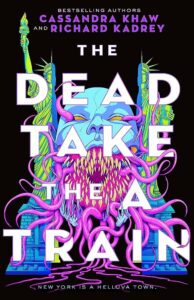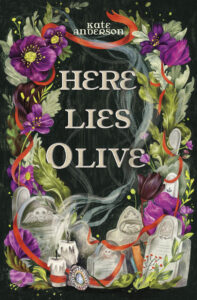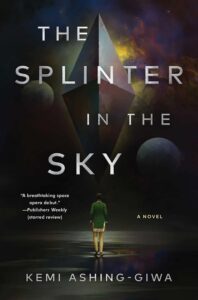Buy this from Bookshop.org to support local bookstores and the Lesbrary!
The Space Between Worlds is one of the best stories I have ever read, and I’m not even exaggerating. This novel follows Cara, a poor girl from Ashtown who is trying to make it in rich Wiley City long enough to become a permanent citizen. Her job? To traverse through different worlds like her own, snagging information that the higher ups at Eldridge need to anticipate the disasters that happened on those worlds before they can happen on Earth 0. Cara is one of a select few who is able to traverse these different realities—because she is dead on most of them. Out of all the worlds open to traversing, Cara is only alive on eight, and if you’re alive on a world you jump to, you usually die because the world cannot handle it. Being alive on only eight worlds makes her a great asset.
This is revealed pretty soon into the novel, so I’ll just say it: the Cara who narrates the novel is not actually the Cara that came from Earth 0. Caramenta, the original Cara, landed on a world where she thought she had died only for Caralee, that Earth’s Cara, to still be alive: close to dead, but not actually dead. Caralee took the chance when she saw Caramenta’s mangled corpse and assumed Caramenta’s identity, and she’s been the one traversing ever since.
Johnson does a great job with the pacing of this novel. Every new bit of information came at the right time and with just the right amount of foreshadowing. Even when I knew what was coming next, Johnson still surprised me, because it happened so much faster than I expected it to. Reading this book was like getting punched in the gut over and over and over again in such a good way. There was never a moment or a plot point that I thought should have been cut or changed. Johnson never shied away from a surprise twist; instead, she went full throttle into it and simply expected the reader to catch up. The novel kept its pace until it ended, and I had to sit there for a moment after I was done and just figure out how to breathe again.
As someone who loves stories with alternate timelines and dimensions, this is such a unique and refreshing way to read it. On Caralee’s Earth, she knew Emperor Nik Nik, and she was his plaything to do with as he pleased. She has seen the Emperor across different worlds, and he is the same on all of them…except for Earth 175, the newest Earth Caralee is tasked with traversing. Johnson did such a good job showing how different this Nik Nik is from the rest of them. Cara’s trauma follows her, and she assumes that this Nik Nik is the same as all the others, only for him to be likeable, and funny, and kind. Going with Caralee through that emotional minefield kept the pages turning, and I cared so deeply about Cara’s relationship with that Nik Nik that I wound up crying when he added her picture to a necklace that held pictures of his dead loved ones. He’s so different from the Nik Nik that Caralee remembers, and I don’t know that I’ve read a story that skips around timelines before this one that lets a character be that different from the other versions of himself. Earth 175 Nik Nik helps heal Caralee’s trauma, and it was so cathartic to read as she started to believe he really could be that much better than the one she left behind. The world of the story is also so large and detailed. Ashtown and Wiley City come to life on the page, no matter what timeline or Earth we are on.
I’m not usually a slow burn kind of person, but Johnson might have changed my tune. The romance between Cara and Dell, the coworker who sends her to the other Earths, was a delightful mix of yearning and miscommunication that I found myself enjoying! Cara is head over heels for Dell from the start of the book, and she flirts with her every moment she can because she thinks Dell will never like her back. When the details of their relationship that Carelee has been missing finally come out, it hits like a train, and every interaction at the beginning of the book makes that much more sense. Cara never shies away from her feelings for Dell. Even when she spends time with Earth 175 Nik Nik, she always makes sure to separate her feelings for Nik Nik from her feelings for Dell. Nik Nik is her ex, but Dell is the love of her life.
I am also a big fan of stories that explore relationships between siblings, and Johnson also did a great job with that. Caralee cares so much about Caramenta’s little sister Esther and about the other members of a family Caralee never got to have, and it is one of the best relationships in the entire novel. The relationship between Nik Nik and a brother who died in most worlds is also something Johnson explores more than once, and I found myself caring about them all so, so much. Johnson’s characters are so rich, no matter what Earth they are on, and I can see myself rereading this book soon just to get a glimpse of them again.
Trigger warnings for: death, gore, domestic abuse, traumatic experiences/memories, and violence.

